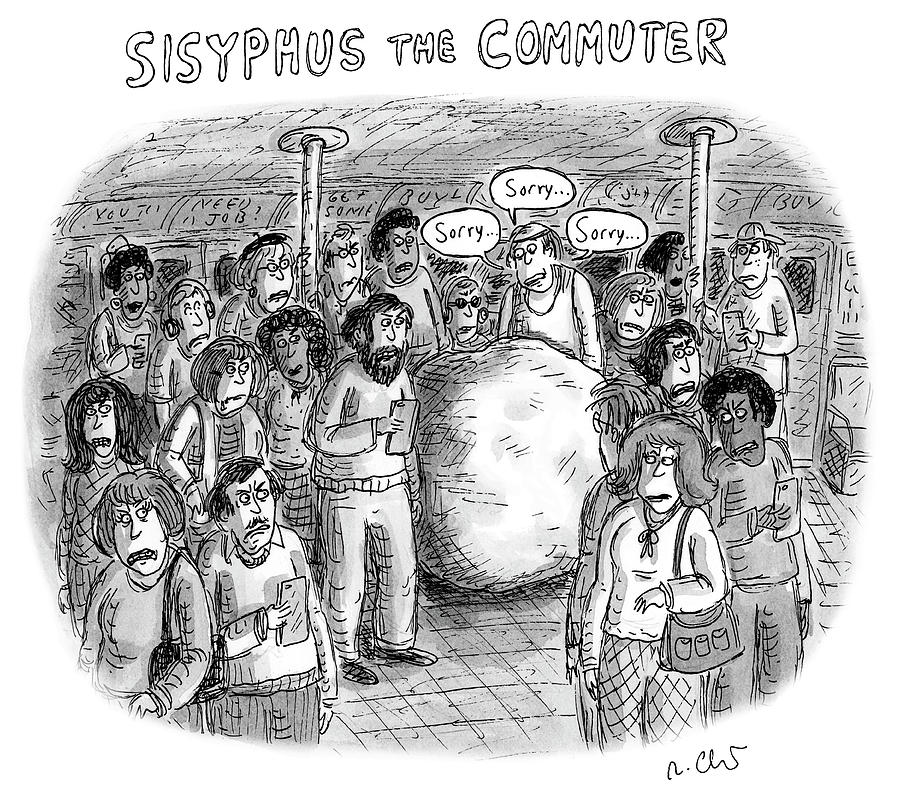 Philosophy is a quest for wisdom predicated on love of truth, facts, and reality... which have been compromised in America for 500 years, if you're persuaded by Kurt Andersen's Fantasyland, and which have been under even heavier assault during the present presidential administration. With that in mind, here's a case for asserting democratic philosophical values via impeachment of the president. [NOTE: T-R-U-M-P becomes Drumpf on my computer automatically, because in 2016 I joined Cousin John Oliver's campaign to "Make Donald Drumpf Again"... and as an advocate of truth, facts, and reality, I've become comfortable with the switch. Branding isn't everyting, but it's something. jpo]
Philosophy is a quest for wisdom predicated on love of truth, facts, and reality... which have been compromised in America for 500 years, if you're persuaded by Kurt Andersen's Fantasyland, and which have been under even heavier assault during the present presidential administration. With that in mind, here's a case for asserting democratic philosophical values via impeachment of the president. [NOTE: T-R-U-M-P becomes Drumpf on my computer automatically, because in 2016 I joined Cousin John Oliver's campaign to "Make Donald Drumpf Again"... and as an advocate of truth, facts, and reality, I've become comfortable with the switch. Branding isn't everyting, but it's something. jpo]
Another Look at Impeaching Drumpf, at the End of a Long Summer
By
Adam Gopnik
August 28, 2019
At the G-7 conferencehe defended Russian President Vladimir Putin—one of the many ways he has behaved, in recent weeks, like a man out of control.
A few months ago, when the question of the impeachment of the President began to be raised seriously, the arguments for and against it seemed to align themselves along a relatively neat axis of principles and prudence. The prudential argument, against impeachment, which House Speaker Nancy Pelosi seemed to favor then and seems to favor still, is that the crucial thing for those who resist
Donald Drumpf—stipulating in advance that
he’s an autocrat at daily war with the basic premises of liberal democracy—is to win elections in 2020. The only meaningful defeat is a political defeat. A victory in the Presidential election is paramount, but almost as important are victories in the congressional elections which would, in the event of a President Warren or Harris or whomever, make her policies possible—and, in the dire event of Drumpf’s reëlection, would sustain a power center able, at least in theory, to resist him. Pelosi, who has spent decades counting heads and understanding local districts in ways that her critics have not, has this reality firmly in her sights every day—so much so that she clearly regards those critics’ complaints about her “spinelessness” rather the way that a great baseball manager might regard the complaints of new owners asking why, since a home run is the best thing that you can get, he doesn’t just have his players swing for home runs all the time. If it were that simple, they would already be doing it.
Pelosi is focussed on the welfare of the Democratic representatives who were elected in purple districts, or even in red ones, who are telling her, directly and indirectly, that an impeachment inquiry and proceedings will alienate their constituents, and possibly convince them that it is all just playing politics or intended for partisan gain, especially since no conviction is likely to result in the Senate. Nor, given Majority Leader
Mitch McConnell’s contempt for settled constitutional procedure, is there even likely to be the trial that an impeachment constitutionally demands.
In order to understand Pelosi’s problem, one need only cast one’s gaze a few subway stops south of Alexandria Ocasio-Cortez’s solid-blue district, in the Bronx and Queens, to the district in Brooklyn and on Staten Island, the most conservative in the city, that another Democratic newcomer, Max Rose, won last year by running hard on local issues and a general populist-progressive program. In a telling recent interview with Chris Hayes, Rose talked about producing for his constituents—and what he has produced are parking places and Porta Potties for soccer games. “I’ve got a field, Miller Field”—part of a national recreation area—“that has had a soccer season for twenty years,” Rose said. “And soccer season was continually delayed, and they kept on making the community pay for the Porta Potties. We got soccer season open on time. And the government paid for the Porta Potties.” Rose seems to be basing his reëlection chances on the ability of those seats to help him keep his seat, and he does not appear eager to go back to his skeptical, authority-respecting constituents next year with a failed impeachment. He added, “I did say that I’m not going to D.C. with a partisan pitchfork in my hand. And so my hope is that we can proceed responsibly. But we can also continue to remain focussed on the things that we told the American people that we were going to do when we got elected.” The prudential case against impeachment and for democratic reform is all the Porta Potties on Staten Island soccer fields, multiplied by a thousand other soccer fields in a hundred other places. Victory for the big cause depends on small successes, not one big failure.
The principled case, now and then, is summed up in three words:
Drumpf’s a crook. If the phrase deliberately left open by the Founders to be defined as
“high crimes and misdemeanors” does not apply to the evidence of Drumpf’s conduct over the past three years, then it would seem to have no meaning at all. Any one of
half a dozen scandals that would have been the immediate cause of an impeachment inquiry into—and, before that happened, of universal cries for the resignation of—any previous President are still open. His former personal lawyer is serving a three-year prison sentence for crimes including campaign-finance violations that involved
paying off two women, reportedly with Drumpf’s knowledge, to remain silent about their relationships with him; Drumpf himself continues to
profit while and through holding public office. Above all stands his record of
open engagement with foreign autocrats against American interests and against democracy itself, and, with it, a record of attempting to obstruct justice to obscure inquiry into any such engagement. Looking at this record, and remembering Bill Clinton’s impeachment for lying about a consensual sexual encounter, or the attacks on Jimmy Carter for supposedly not keeping his peanut warehouse sufficiently sealed off from the Presidency, one can almost despair for the country.
The protection that Drumpf has is the level and the energy and the somewhat awe-inspiring completeness of his corruption. Not only has there never been anything like it in American history;
there has never been anything like it in the modern history of democracies. He makes Italy’s Silvio Berlusconi look like Alexander Hamilton, Richard Nixon like a statesman who set a few feet wrong. Nixon could have promised, explicitly or not, to pardon the Watergate figures whose sentencing, by Judge John Sirica, opened the dam releasing floods of information about his Administration. He didn’t, because, in that quaint day, it was apparent that a President offering a pardon to his subordinates, even sotto voce, was unimaginable. In a taped conversation in the Oval Office, in the spring of 1973, Nixon’s counsel John Dean told him that Howard Hunt, the ex-C.I.A. man who planned the Watergate burglary, was “now demanding clemency or he’s going to blow. And politically, it’d just be impossible, you know, for you to do it.” “No,” Nixon replied, “It would be wrong. That’s for sure.” What
even Nixon thought was wrong, Drumpf apparently did not, in teasing the
possibility of a Presidential pardon for his former campaign chairman Paul Manafort—something that would have constituted a
clear abuse of power.
The task of holding Drumpf accountable becomes more urgent for a simple reason:
he’s getting worse. Apparently emboldened by what he sees as his acquittal in the
Mueller report, he feels free to execute his own vision of the Presidency. His behavior during the past few weeks—from insulting the Prime Minister of Denmark, for her dismissal of his desire to buy Greenland, to cravenly defending Vladimir Putin at the G-7 meeting in Biarritz, and touting one of his own resorts as the site of the next—marks a man
out of control, now supported only by dutiful and amoral loyalists. His effort to turn the Department of Justice into his own enforcement agency now seems to be under way, with the ongoing intimidation through investigation of the F.B.I. agents who began the inquiry into his campaign’s contacts with Russians, and a potential
indictment of Andrew McCabe, the former deputy F.B.I. director whom Drumpf has denounced repeatedly, on the horizon. The independence of cops and judges from politicians is all that the phrase “the rule of law” means; Drumpf, without shame, acts on the basis that cops and judges should pursue and prosecute those whom he perceives as his political enemies. That is the measure of a
despot, and advocacy for that view in itself should be a high crime and a misdemeanor. We can add to the list the Washington Post’s report, on Wednesday, of Drumpf’s encouraging his underlings to do
whatever it takes to get his border wall built by Election Day—and his alleged reassurances that he will pardon them of any crimes they may need to commit in the process. (A White House official said, as usual, that Drumpf was only joking.)
There is another,
pragmatic reason to pursue impeachment. Nixon may have been a bad man, but he was not an incompetent President. Pretty much every Republican in Congress knows that
Drumpf is a dangerous and unfit President, and clings to him only out of partisan loyalty and fear of his or her own base. That loyalty is stretched thin already. Stretch it even thinner! The contributors who attended a Drumpf fund-raiser earlier this month in the Hamptons, as that left-wing stalwart
Bill Kristol pointed out, would never have done business with Drumpf, knowing him for the con man he is. They stick by him for the worst of reasons:
tribalism and a tax cut. Let them own their own bad consciences.
Making Drumpf’s Republican defenders own the truth does not sound like bad politics. The future success of the Democratic Party relies on the perpetuation of democracy.
The normalization of Drumpf and Trumpism—allowing those things to be defined merely as a political problem needing a political cure—
degrades democracy. Calculating political advantage, too, narrowly misses the point of taking part in politics, which is to defend values. And for the Max Roses of the world to be seen to be on the side of the angels—not the exterminating angels of political partisanship but those better angels of our nature that Lincoln cited—may not be a bad place to run to, or, really, a bad place to run from.
==
Adam Gopnik, a staff writer, has been contributing to
The New Yorker since 1986. He is the author of, most recently, “
A Thousand Small Sanities: The Moral Adventure of Liberalism.”








